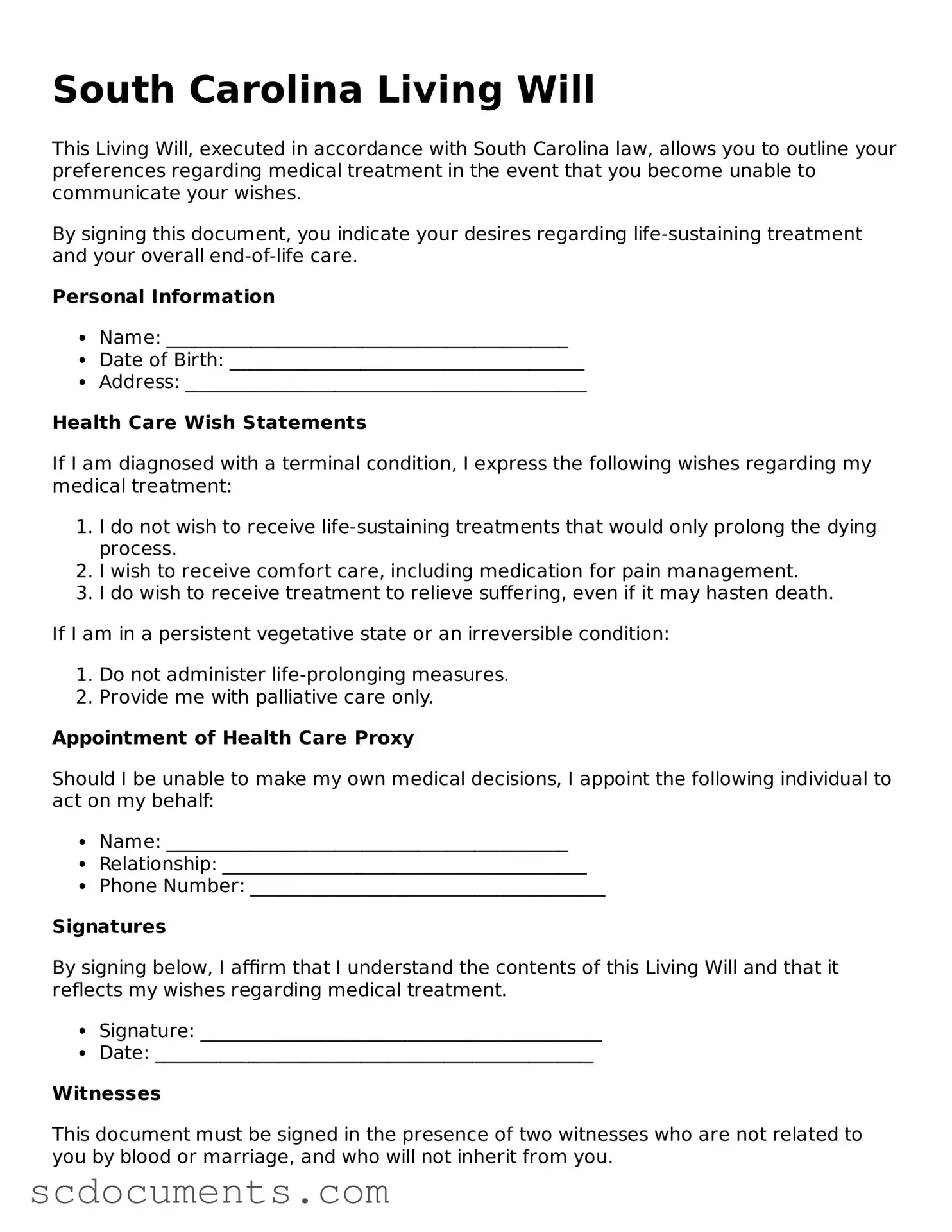Legal South Carolina Living Will Form
Dos and Don'ts
When filling out the South Carolina Living Will form, it is important to follow certain guidelines to ensure that your wishes are clearly expressed and legally valid. Here are some things you should and shouldn't do:
- Do: Clearly state your medical preferences regarding life-sustaining treatment.
- Do: Sign and date the form in the presence of two witnesses or a notary public.
- Do: Review your Living Will regularly and update it as needed.
- Do: Discuss your wishes with family members and your healthcare provider.
- Don't: Use vague language that could lead to confusion about your wishes.
- Don't: Forget to ensure that your witnesses are not related to you or your healthcare provider.
- Don't: Leave the form unsigned or undated, as this can invalidate it.
- Don't: Assume that verbal instructions are sufficient; written documentation is crucial.
File Data
| Fact Name | Description |
|---|---|
| Definition | A South Carolina Living Will is a legal document that outlines a person's wishes regarding medical treatment in case they become unable to communicate those wishes themselves. |
| Governing Law | The South Carolina Living Will is governed by the South Carolina Code of Laws, Title 44, Chapter 77. |
| Requirements | The form must be signed by the individual and witnessed by two individuals or notarized to be valid. |
| Revocation | A person can revoke their Living Will at any time, either verbally or in writing, as long as they are competent to do so. |
| Healthcare Proxy | A Living Will can be used in conjunction with a Healthcare Power of Attorney, allowing someone to make healthcare decisions on behalf of the individual. |
Documents used along the form
A Living Will is a crucial document for individuals wishing to outline their preferences regarding medical treatment in the event they become unable to communicate their wishes. Alongside this form, several other documents may be utilized to ensure comprehensive health care planning and decision-making. The following list includes some of the most common forms and documents associated with a Living Will in South Carolina.
- Durable Power of Attorney for Health Care: This document allows an individual to appoint someone to make medical decisions on their behalf if they are unable to do so. It grants authority to the designated agent to act in accordance with the principal’s wishes.
- Employee Handbook Template: For businesses looking to set clear expectations, our comprehensive Employee Handbook documentation serves as a vital resource for establishing company policies.
- Do Not Resuscitate (DNR) Order: A DNR order is a medical order that specifies that a person does not wish to receive cardiopulmonary resuscitation (CPR) in the event of cardiac arrest. This document must be signed by a physician.
- Health Care Proxy: Similar to a Durable Power of Attorney, a health care proxy designates an individual to make medical decisions for someone else. It is often used to ensure that the person making decisions is someone the patient trusts.
- Advance Directive for Health Care: This is a broader term that encompasses both Living Wills and Durable Powers of Attorney for Health Care. It allows individuals to outline their healthcare preferences and appoint someone to make decisions on their behalf.
- Organ Donation Consent Form: This document indicates an individual's wishes regarding organ donation after death. It can be included as part of an advance directive or completed separately.
- Patient Advocate Form: This form designates a person to advocate for the patient’s wishes and preferences regarding medical treatment and care. It can be used in conjunction with other advance directives.
- Medical Records Release Form: This document allows an individual to authorize the release of their medical records to designated individuals or organizations. It ensures that the appointed agents have access to necessary medical information.
Incorporating these documents can provide clarity and support for individuals and their families during challenging medical situations. Each document serves a specific purpose and together they create a comprehensive plan that reflects an individual's healthcare preferences.
Key takeaways
Filling out and using the South Carolina Living Will form is an important step in ensuring your healthcare wishes are respected. Here are some key takeaways to consider:
- Understand the Purpose: A Living Will outlines your preferences for medical treatment in case you become unable to communicate your wishes.
- Eligibility: You must be at least 18 years old and of sound mind to create a Living Will in South Carolina.
- Specificity is Key: Clearly state your preferences regarding life-sustaining treatments, such as resuscitation and artificial nutrition.
- Witness Requirements: The form must be signed in the presence of two witnesses who are not related to you or your healthcare providers.
- Revocation: You have the right to revoke or change your Living Will at any time, as long as you are mentally competent.
- Keep Copies Accessible: Once completed, share copies of your Living Will with your healthcare provider and loved ones to ensure they are aware of your wishes.
- Review Regularly: Life circumstances change. Regularly review your Living Will to ensure it still reflects your current wishes.
Other South Carolina Templates
Durable Power Printable Power of Attorney Form - This form is essential for health and financial planning.
For anyone dealing with title discrepancies or errors in Missouri, understanding the importance of the Missouri 5177 form is crucial. The Title Assignment Correction Form serves as a formal means to amend information related to vehicle ownership with the Missouri Department of Revenue. It is essential for ensuring that details such as the owner's name and odometer readings are correctly documented. For those looking to rectify such issues, resources can be found at All Missouri Forms, offering guidance on completing this necessary form.
Will Template South Carolina - Allows for flexibility to adjust your decisions as times change.
